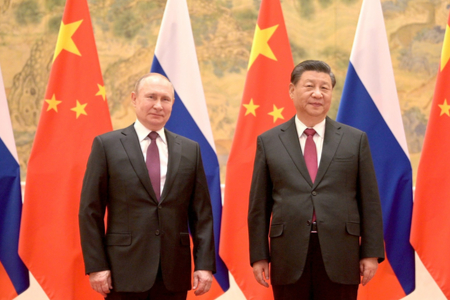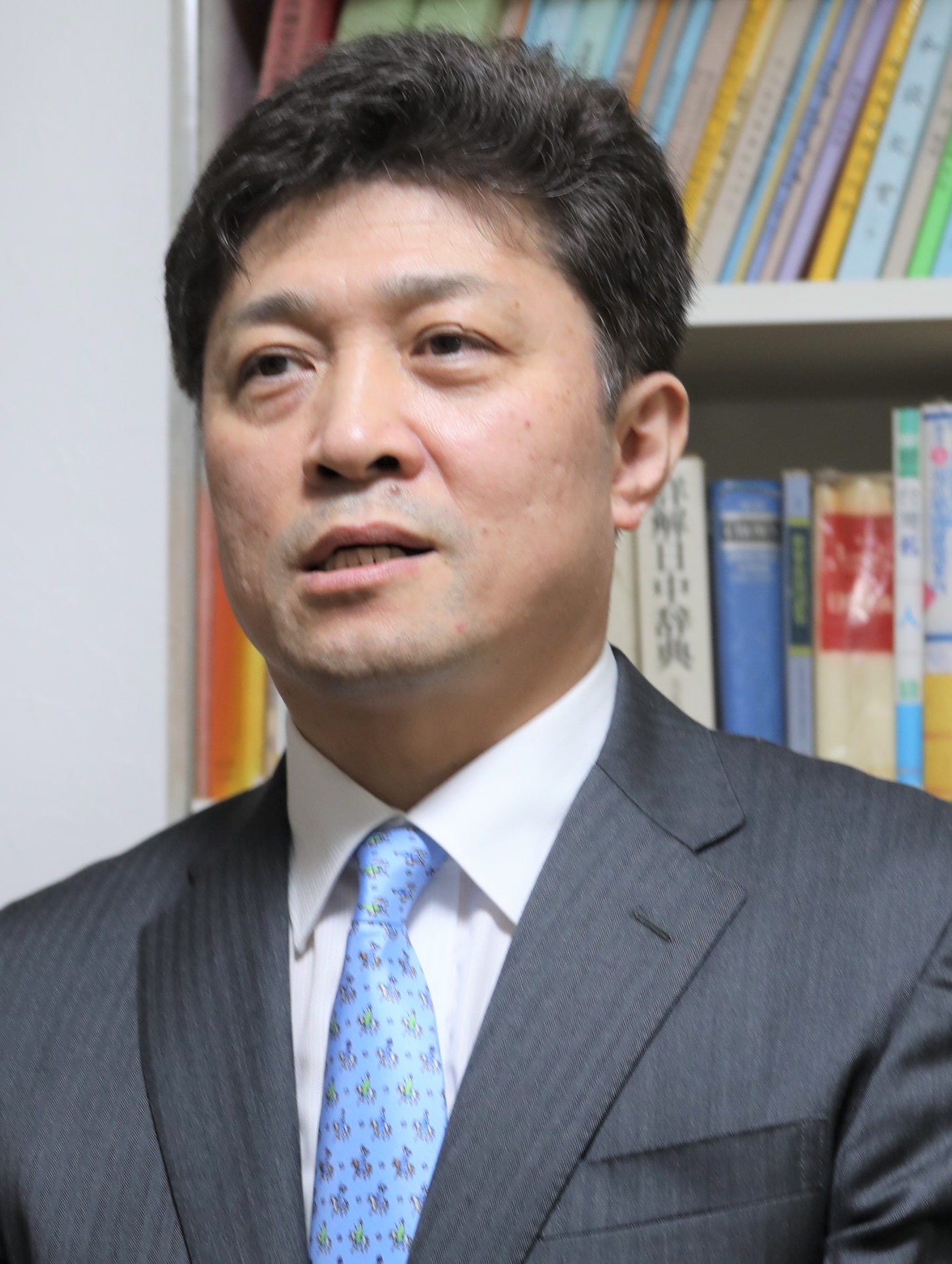“API Geoeconomic Briefing” is a weekly analysis of significant geopolitical and geoeconomic developments that precede the post-pandemic world. The briefing is written by experts at Asia Pacific Initiative (API) and includes an assessment of burgeoning trends in international politics and economics and the possible impact on Japan’s national interests and strategic response. (Editor-in-chief: Dr. HOSOYA Yuichi, Research Director, API; Professor, Faculty of Law, Keio University; Visiting Fellow, Downing College, University of Cambridge)
This article was posted to the Japan Times on April 28, 2022:
https://www.japantimes.co.jp/opinion/2022/04/28/commentary/world-commentary/china-taiwan-russia/
API Geoeconomic Briefing

Photo: Aflo
April 28, 2022
Russian invasion may sway China against a forceful approach to Taiwan
MATSUDA Yasuhiro
Professor, Institute for Advanced Studies on Asia, The University of Tokyo

As the world watches Russia’s invasion of Ukraine, there are growing concerns over whether China will undertake its own military invasion — of Taiwan.
However, it is not so likely that China would try to unify with Taiwan by force, or seize the remote islands controlled by Taiwan in the near future, given the high costs and risks of taking such actions.
We must also consider the reasons why China would hold back on taking military action against Taiwan from an economic perspective.
This is because unifying with Taiwan is not the sole national goal for the Chinese Communist Party. We should not forget the fact that, for the party, economic development and the improvement of people’s living standards takes higher priority.
‘Peaceful unification’
To begin with, China has been, and still is, aiming for a “peaceful unification” with Taiwan.
Why? It is because the peaceful unification policy is closely connected with China’s own “peaceful development” strategy.
Many people think that the peaceful unification policy is aimed at China and Taiwan unifying in a peaceful manner.
That is certainly true, but what we should place greater focus on is the reality that the environment based on peaceful unification policy has helped China boost its economy.
Even after the end of the Chinese Civil War in 1949, the Taiwan Strait literally was a battlefield, as an extension of the war between the Kuomintang and the Chinese Communist Party continued through the 1970s.
China had been saying that Taiwan must be “liberated,” while Taiwan called for “retaking the mainland.”
In the 1950s, China attacked offshore islands held by Taiwan. On the other hand, Taiwan deployed troops on remote islands and conducted military operations — although on a small scale — bombing mainland China, conducting landing operations on the mainland, conducting maritime attacks and letting its inland guerillas stage armed uprisings.
They exchanged fire and launched aerial and naval battles from time to time. Pilots sought political asylum and spies were arrested on both sides.
However, China declared it would stop bombarding Kinmen, a group of islands off the coast of China that are controlled by Taiwan, on Jan. 1, 1979. And in 1981, the Chinese government officially announced its peaceful unification policy regarding Taiwan.
In 1991, Taiwanese President Lee Teng-hui proclaimed an end to the state of war between Taiwan and China, but China says the two sides are still under hostility.
The unfinished Civil War
In other words, while military attacks have stopped since 1979, a state of war between China and Taiwan has not completely ended, in legal terms.
By declaring peaceful unification as its policy, China effectively brought peace to its coastal areas including the Taiwan Strait and adjacent sea lanes.
It would have been impossible for China to shift to reform and an open-door policy without this peaceful environment.
Because of the significance of this historical background, China cannot simply withdraw its peaceful unification policy and unite with Taiwan by force.
Still, China’s Anti-Secession Law passed in 2005 states in Article 8, “In the event that the ‘Taiwan independence’ secessionist forces should act under any name or by any means to cause the fact of Taiwan’s secession from China, or that major incidents entailing Taiwan’s secession from China should occur, or that possibilities for a peaceful unification should be completely exhausted, the state shall employ non-peaceful means and other necessary measures to protect China’s sovereignty and territorial integrity.”
“Non-peaceful means” are interpreted as including the use of force.
Based on the law, however, we must note that military attacks or intimidation by force are allowed only for the purpose of blocking Taiwan’s independence and not for the purpose of unifying with Taiwan by force. The two issues are completely different.
Some believe that under Chinese President Xi Jinping’s administration, China might shift towards a more coercive policy to push forward unification backed by armed forces.
The Xi administration is apparently making the shift because there is almost no possibility for Taiwan, led by the Democratic Progressive Party, to choose to unify with China, and also due to the fact that has China grown more confident amid an increase in its national power.
Although such a shift would not actually lead to combat, a move aimed at achieving unification backed by military power means China might veer off from the current framework — seeking peaceful unification based on negotiations.
This is why concerns have grown over a possible contingency in Taiwan in recent years.
Lessons from the war in Ukraine
As concerns grew over the increasing threat of a Taiwan contingency, Russia launched a full-scale invasion of Ukraine on Feb. 24. But ironically, the war in Ukraine is showing the world how risky it is to resort to the use of force.
China presumably knew of Russia’s invasion plan beforehand, but it must not have even anticipated that Russia’s military actions would fail so dramatically, bringing the worst humanitarian crisis on Europe since World War II and making Russian President Vladimir Putin arguably the greatest villain of the century so far.
The only thing Russia is likely to see at the end of this war will be a miserable victory at best or a crushing defeat at worst.
Moreover, it has become clear that Russia’s weapons are not effective enough, while the Ukrainian troops are putting up an unexpectedly good fight backed by the United States and others providing them with weapons and intelligence information.
While the morale among Russian soldiers is low, the Ukrainian military and civilians fighting to defend their homeland are maintaining a higher level of morale.
After going through such a fierce battle, Ukraine will never succumb to Russia nor choose to unify with the country.
In a similar way, if China invades Taiwan, it could effectively trigger an irreconcilable independence war for Taiwan to formally declare sovereignty.
Looking from a military perspective, we can say that China’s hurdles for using force against Taiwan have become considerably high.
Another important lesson for China is the fact that Western countries have worked together to impose sanctions on Russia one after another.
Many powerful sanctions have been put in place, including freezing the overseas assets of senior Russian government officials including Putin, excluding a number of Russian banks from the SWIFT cross-border payments system used by financial institutions worldwide and freezing the Russian central bank’s foreign currency reserves.
Such sanctions might not stop Russia’s military operations, but they are certainly shaking the Russian economy.
If the sanctions last for a long period of time, Russian people are highly likely to be left out of global development for generations to come.
China’s economy is roughly 10 times the size of Russia’s. And just as the world depends on China, China also relies on the rest of the world.
If China launches a full-scale invasion of Taiwan, the country is likely to face similar economic sanctions, which will have an impact to a certain extent.
Considering that many elite officials within the Chinese regime keep their assets and families overseas, sanctions targeted at individuals and companies will be effective to some extent as well.
Above all else, even if China were to successfully achieve unification with Taiwan by force, if the Chinese economy suffered a heavy blow as a result, it could greatly shake the legitimacy of the Communist Party’s rule.
Russia’s decline
While learning lessons from the Ukraine crisis, China will continue to propagate differing views on the surface.
It will keep on with messages such as: threats by nuclear weapons will prevent the U.S. from getting involved; the Chinese economy is too gigantic to impose sanctions on; Chinese troops and people will fight with high morale for operations to unify with Taiwan by force; temporary sanctions will cause no problems if unification with Taiwan quickly becomes a fait accompli.
This is because China fears that Russia’s failure and decline can fuel independence movements in Taiwan.
Since such propaganda from the authorities has influence in China, there are people who believe that what the Chinese government is saying is true.
But even in China, where information is tightly controlled, people, especially intellectuals, are beginning to grasp the real situation of Russia’s aggression in Ukraine.
A narrative stating that Russia’s invasion of Ukraine has turned out to be the beginning of the end of the Putin administration might spread in China, given that Moscow is paying a high price as a result of international sanctions.
The Chinese people are going to witness the decline of Russia, which launched an invasion of Ukraine, over the long term. The Russian economy will collapse and shrink, Russian government officials will be isolated in the global community and will be excluded from international events.
Russia’s medium- to long-term deterioration due to strengthened sanctions means that China will lose backing if it uses force against Taiwan in the future. It will serve as a strong warning for China to prevent it from exercising force against Taiwan.
For China, the peaceful unification policy is still the status quo. And it is because of that policy that Beijing can maintain its peaceful development strategy.
It would be much less risky for China to continue blocking Taiwan’s independence through economic exchanges rather than resorting to the use of arms against Taiwan.
In order to make Chinese leaders clearly understand this, Japan and other like-minded countries should continue implementing sanctions against Russia.
Disclaimer: The views expressed in this API Geoeconomic Briefing do not necessarily reflect those of the API, the API Institute of Geoeconomic Studies or any other organizations to which the author belongs.
 APIニュースレター 登録
APIニュースレター 登録